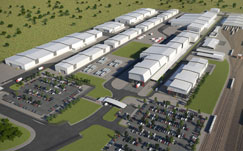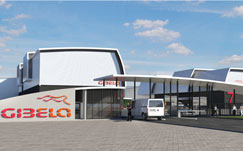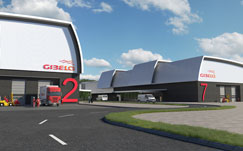Gibela on track for South African factory
2 July 2015
The Gibela Rail Transport Consortium (Gibela) is gearing up to start the construction
of its R1-billion, 85 000m² factory complex at Dunnottar in Ekurhuleni, Gauteng.
Construction is scheduled to start in the third quarter of this year.
Once up and running, it will be building trains at a hitherto unheard-of peak rate of
62 trains a year – and South Africa will have taken a very visible and significant
leap into the world of high-tech train manufacturing, according to Gibela. "South
Africa's 40-odd year gap when it comes to train-building technology is about to
close," it says.
The factory is part of a contract signed by the Passenger Rail Agency of South
Africa (Prasa) with the Alstom-led consortium in October 2013. Work was meant to
start on the factory in the beginning of this year, but delays in securing the site led
to delays in construction.
The R51-billion contract is to supply Prasa with 600 new trains over
10 years. The
first 20 trains are being made in Brazil; the balance will be assembled at the
Dunnottar complex. The last train is scheduled for delivery in 2027.
This project will, in keeping with the mandate of Prasa, help to restore the viability
of South Africa's commuter rail system, says Gibela. But the expanded fleet of
trains is only one of the benefits: others are the skills and technology transfer from
Gibela's French parent company, Alstom, as well as local sourcing of specialised
components that will contribute to South Africa's industrial growth.
Job creation
Trains are built by people, and once fully operational, the Dunnottar facility employ
at least 1 500 people, the majority of whom will be skilled artisans. Recruitment is
already at an advanced planning stage for permanent positions, with clear career
paths for those selected.
Preference will be given to those who have academic qualifications as well as
artisanal skills. Most of those recruited will be drawn from the areas adjacent to the
manufacturing facility but given the scarcity of the required skills, the net will be
cast wider.
However, Gibela will undertake training as well in various rail-related skills for
possible jobs in the rail industry.
At the outset, artisans possessing a range of skills, including leadership, will be
selected for intensive training at Alstom's Brazilian facility where the first 20 of the
Prasa trains are being made. They will then be able to pass on their skills to their
colleagues back in South Africa on their return.
More than 20 Gibela employees, the majority of whom are engineers, are already in
France, Italy, Belgium and Brazil, where they are receiving a cross-section of
advanced skills that will be critical in supporting a manufacturing rate that will,
according to Granger, "test the abilities of the most experienced and large original
equipment
manufacturer at its best manufacturing unit".
Gibela will ramp up from the current staff complement of 112 to 350 by the end of
the company's March 2016 financial year.
Supplier network
Parts and components needed to build the modern trains will need to be state of the
art. New and established South African suppliers will be brought on board, some of
whom will occupy premises at the Dunnottar factory site. A robust, sustainable local
supplier base needs to be developed to achieve the company's 65% local content
obligations, it says.
To build ties with local suppliers, Gibela has been interacting with local suppliers to
leverage the company's expertise and that of Alstom to equip them with capabilities
to be competitive and to manufacture at the required rate and quality. "It is through
these relationships and the transparent exchange of information that challenges
such as lack of industrialisation and industrial capacity shortages
can be overcome
and the supply of long-lead items (on time, on budget and in the right quantities)
assured," says Gibela.
Work on the first 20 trains in Brazil is well on track, and the first train with its six
cars is in the testing phase. Shipment to South Africa is planned in September, with
on-shore delivery in November. All six cars of train number two are in the fitting
phase and production for the rest is on-going.
"We are pleased with the progress made and our Brazilian colleagues are now
getting ready to welcome South African artisans and to not only impart skills but
also benefit from language and cross-cultural exchanges," says Granger.
SAinfo reporter
 Artist's representation of aerial view of the Gibela complex. (Image: Supplied.)
Artist's representation of aerial view of the Gibela complex. (Image: Supplied.)
 Artist's representation of the guardhouse at the Gibela complex. (Image: Supplied.)
Artist's representation of the guardhouse at the Gibela complex. (Image: Supplied.)
 Artist's representation of the Gibela complex. (Image: Supplied.)
Artist's representation of the Gibela complex. (Image: Supplied.)





